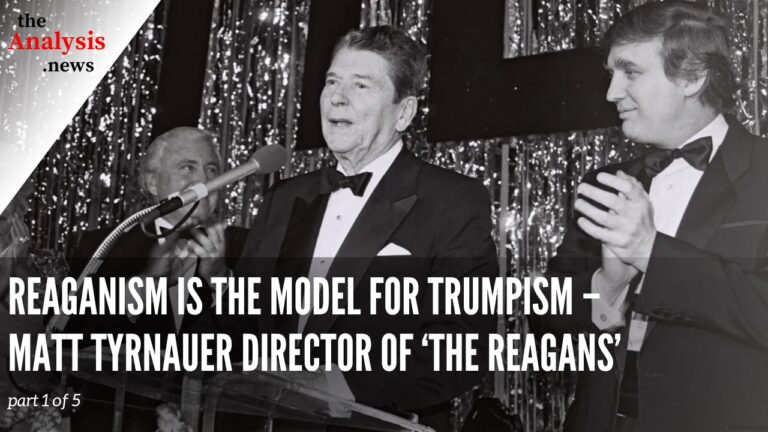Prabhat Patnaik, professor emeritus at Jawaharlal Nehru University, New Delhi, reflects on the COVID-19 shock that has worsened the crisis triggered by globalized finance. Only two possibilities emerge: restructure capitalism by controlling finance, or let the tendencies towards very coercive forms of fascism grow.
Lynn Fries / GPEnewsdocs.com
TRANSCRIPT
LYNN FRIES: Hello and welcome. I’m Lynn Fries, producer of Global Political Economy or GPEnewsdocs. This is a report on a conversation with Prabhat Patnaik on why capitalism is going to be finding it very difficult to come to terms with a post COVID-19 world.
Prabhat Patnaik is professor emeritus of economics at Jawaharlal Nehru University in New Delhi. An eminent and prolific economist, Patnaik’s published work includes books like The Value of Money and Accumulation and Stability Under Capitalism. In a forthcoming book titled, Capital and Imperialism, to be released in February, co-authors Prabhat Patnaik & Utsa Patnaik will publish their comprehensive survey of capitalism’s colonialist roots and uncertain future.
We go now to our conversation with Professor Prabhat Patnaik.
Prabhat, What I want to get at in this conversation is why the working population is being pushed into acute distress, unemployment and insecurity. You’ve long argued that capitalism throughout the era of globalization under neoliberalism has been characterized by a conflict between the interests of finance and working people. And with COVID-19 this is intensifying. So we’re going to talk about that and let’s start with one of the main pillars of neoliberal policy – the withdrawal of the state from demand management.
PRABHAT PATNAIK: Yes, I mean, I think the main aspect of the current neoliberal policy is the globalization of finance. Under the Bretton Woods System countries imposed capital controls. In fact, European countries had very strict capital controls. Capital could not come in and go out as it wished. And therefore this capital control included also financial controls. Now, one thing which has happened which I think is the crux of the current neoliberal globalization is the removal of capital controls and therefore the freedom of finance to move around globally. Now, if finance moves around globally but we have Nation States; in that case, the Nation States lose their autonomy. They have to do what finance wants them to do because otherwise finance would in fact flow out of the country causing a bankruptcy of that particular country. Therefore they have to be very careful that they do nothing to offend finance.
Now, for any state intervention in raising demand, it is important that state expenditure be financed either through a fiscal deficit or by taxing the rich or taxing capital. Either of these are disliked by finance. And therefore, in a world in which finance has the upper hand the state simply lacks the instruments through which it can actually intervene in raising the level of aggregate demand. And that is exactly what has happened. Namely that fiscal policy for raising aggregate demand is out. The only thing the state is allowed to use is monetary policy but monetary policy is an extremely blunt instrument that predictably has not been very effective. Which is why the capitalist countries have been caught in a protracted crisis starting from 2008 itself.
FRIES: You basically say that to view the neoliberal State as withdrawing in favor of the market is misleading. That the State is acting in accordance with the demands of international finance capital and the domestic corporate financial oligarchy integrated with it. And it’s promoting rather than restraining the spontaneity of the capitalist system. Is that right?
PATNAIK: That’s right. You see basically the conclusion which people had come to in the 1930s Depression; for instance Keynes argued that capitalism, save in exceptional circumstances, is saddled with mass unemployment. That its tendencies are to generate mass unemployment. That’s because of the fact that it is essentially a flawed system in which there is a lack of coordination between whatever is required as investment to keep the level of demand up and of course what people actually save. So there is a tendency for there to be an overproduction because demand is not enough. Keynes thought that you could actually overcome this anarchy of the system through state intervention.
But the point is that, that is something which really required, I mean the state if you like is an external agency that intervenes in the spontaneity of capitalism, in the autonomous behavior of capitalism to actually introduce an outside agency which acts to bring about certain social objectives. And Keynes did it because he wanted to preserve capitalism against the socialist threat. He had seen the Bolshevik Revolution. And he was clearly aware that if the state; if capitalist countries continue to have the kind of unemployment that they had seen in the 1930s then of course socialism would triumph. So what he wanted is to keep socialism in check by changing capitalism by overcoming its spontaneity, by introducing the state as an external rational agent that actually introduces measures that ensure that social objectives are met, like full unemployment.
The Keynesian vision imagined that the state would override the behavior of the system. But if it is the case that the State itself is now dominated by the predilections of finance, the state cannot do anything if finance doesn’t like it. Then the state has got subordinated under the spontaneity of the system. You actually have a reversal of the situation from what Keynes had visualized, what had transpired in capitalism for the couple of decades after the Second World War, and what transpired after that.
FRIES: In government policy in the 1950s and 60s, labor parties pretty much backed labor, the working class. But since Reagan and Thatcher, it doesn’t much matter which political party is in power. Governments on both sides of the aisle back neoliberal policies.
PATNAIK: You know one of the things is that as long as you are caught in this web of globalized finance, you have to do what they want you to do. Tomorrow, for instance, even if you had the most extreme left government you can imagine but that kept the country inside this movement of globalized finance then that left government also would be adopting policies exactly similar to what the Tories or the Labour or Tony Blair would be adopting. Therefore the point is whether you are within this vortex of globalized finance or whether you take the country out of it. Look at Greece, for instance, Syriza came to power on a certain platform but in fact it didn’t do anything different from what the others were doing.
So as long as you are within this web of globalized finance then you’ll be more or less coerced into doing the things that finance wants you to do. Otherwise there would be a crisis. So the only way to checkmate the dictates of finance is if the country could be taken out of this web of finance through capital controls, through a re-implementation of capital controls. But that on the other hand, is going to bring about great hardship in the transitional period. Because if finance does not come in, many countries have current account deficits and balance of payments, how do you meet those deficits?
If you cannot meet those deficits -and that was for instance Syriza’s problem – if you cannot meet those deficits then you cannot really import from outside. If you cannot import from outside, you’d have to have import controls. If you have import controls, then the standard of living of the domestic population would temporarily, at least, go down. So getting out of it is also very difficult. But on the other hand if you don’t get out of it then you are caught in this web of globalized finance doing exactly what every other government is doing.
FRIES: The Financial Times recently ran an editorial that radical reforms in reversing the policy direction of the last four decades need to be put on the table. In commenting on that FT editorial, you made the point that finance capital does not voluntarily make concessions.
PATNAIK: Right. You know, I mean obviously no matter what the Financial Times says, you’d have to persuade finance that it should allow governments to kind of, you know, put restrictions on its movements. The point is finance is not going to willingly sacrifice its ability to go all over the globe in search of profits because of the fact that some people believe this to be necessary for reviving capitalism. You know, in other words, finance will be looking after its own interests. You know these are not altruistic bodies. Finance is not, after all, going to be looking after the interests, the supposed interests of workers or the next guy in order to preserve the system. It will be interested in looking after its own interests. And that being the case, I believe there will be a lot of opposition.
Can the state override this opposition? One possibility through which the state could do this; if it’s globalized finance, suppose you’re a globalized State. You are a global State. Then matters would be different. And if you don’t actually have a global state, you could have coordinated fiscal action among a lot of advanced country States. But there is no talk even of that. I know that that very recently the European Union has got some kind of a little agreement on this. But on the other hand, that is still being debated. It’s not a major factor. It is something which is also done only in the context of the European Union.
But to get capitalism going, you’d require for instance coordinated fiscal stimulus across many advanced countries. And there’s no talk of that. If we’re talking about any given particular country, then that particular country can get out of the web of finance by putting controls on capital, particularly financial flows. And of course, that would bring enormous transitional difficulties, hardship for the people which no government is really caring to do. Which is why capitalism is now caught in a kind of structural crisis from which there is no easy exit.
FRIES: In times of financial crises when government deficit spending was rolled out to preserve the financial system, it was followed by austerity to get the budget deficit back down to the limits imposed by neoliberal policy. And that included cuts to healthcare the consequences of which are being all to clear with COVID-19. Talk more broadly on the situation with COVID-19.
PATNAIK: Well, you know COVID-19 is coming in the context of a crisis of capitalism that was already there. COVID-19 of course has worsened the crisis in the sense that there is huge unemployment. Let’s imagine tomorrow the COVID-19 crisis gets over. If it gets over then two things would happen. The first thing that would happen is there would be no automatic recovery. Because after all, even though COVID had worsened things when COVID disappears consumption might recover but recovery of consumption will not be a recovery of investment.
As a result, even if there had been no crisis in capitalism the sheer shock of COVID-19 would have actually delayed recovery for a very long time. In other words, it would have generated a crisis that would not have disappeared with the disappearance of COVID-19. But on the other hand, since it is already the case that there was a crisis before COVID-19 in capitalism now that crisis will again come into its own. So you would find that for both these reasons, namely recovery is problematical from such a shock anyway , and additionally, such a shock occurred in the midst of crisis, capitalism is now going to be finding it very difficult to come to terms with a post COVID world.
There are two possibilities which I see opening up. You know, one possibility is for instance what people like the Financial Times are talking about. Namely that look, you have to restructure capitalism. And this restructuring of capitalism, going back on some of these policies of the last four decades, would require controlling finance. And how they’re going to bring that about I do not know. But at least there that is one possibility. The other possibility is that in the face of this protracted crisis, there would be a tendency towards fascism. So you actually try and control resentment, control resistance through sheer force. And that is something that we see happening in a number of countries, including mine.
FRIES: But even authoritarian governments seemed to be enthralled with global finance and so they too do not have the solution. Can you comment on that?
PATNAIK: Exactly. Yeah, you see one of the big differences between the 1930s and now is that fascism in the 1930s is one that at least got these countries out of the crisis and out of unemployment. Germany in 1933, Japan in 1931: they actually undertook large-scale military expenditures in order to generate demand. And financed by borrowing in order to generate demand whereby you actually had near full employment. As a matter of fact therefore there was a brief period between the coming out of the depression by these countries and the actual major start of the war when some of these fascist governments actually became quite popular. Because they had got the countries out of the Depression and the horrors of the war still had not visited them.
But on the other hand today, you cannot do that. Because at that time when the government financed military expenditure they did so by borrowing which means by fiscal deficit. They had enlarged fiscal deficits dramatically. But on the other hand today, finance is globalized. Those days it was national. Finance is globalized and it does not like fiscal deficits. It can very easily leave the country which is why the governments cannot even undertake larger military expenditures by fiscal deficits. And therefore they really have no way of coming out of the crisis. And therefore the fascism of today will be much more negative in the sense that they would only be using coercive methods to keep popular discontent in check without providing any solution to the crisis of this moment.
FRIES: Commenting on the US stock market boom on the back of US Federal Reserve crisis management, you said a stock market boom in a real economy crisis represents the supreme triumph of finance. Talk more about monetary policy and the role of asset price inflation under neoliberalism.
PATNAIK: Yes, in fact because state expenditure would not be undertaken and at the same time you find that the usual monetary policy levers for generating investment don’t really work. The only thing that is available to these governments is to use monetary policy generate an asset price bubble. Now in the past, the dot-com bubble had an impact on the real economy. They believe that if you can generate the stock market bubble then this would have some impact on the real economy. Why does an asset price bubble have an impact on the real economy? If you are someone who holds one of these assets whose prices have gone through the ceiling, then you feel you are wealthier. When you feel you are wealthier, then you go and spend something.
On the other hand, if you feel you are wealthier, for instance, if the financial asset price increases then it is easier for you to borrow because of course the interest rate is the other side of the price of let’s say the bond. If the bond price is high then the interest rate is low. It reduces the cost of borrowing. And if it reduces the cost of borrowing again you can, you can borrow and spend more. But the point is that if investment is curtailed because there is insufficient real demand a reduction in the cost of borrowing will not help. If it is the case that the wealth effect on consumption, you know, for instance even if people may feel wealthy, they may know that look this wealth is illusory. Tomorrow, I am going to find myself without any kind of, you know, without this wealth. In that case, they would not necessarily spend more on consumption.
The very fact that asset price bubbles worked in the past in generating real demand reduces their capacity to work as effectively in future. Because of the fact that they have collapsed. Because the collapse of the bubble makes people much more chary of actually taking the bubble as seriously in future as they had taken it in the past. But it seems to me that that is the only way in which capitalism can continue in trying to offset the crisis. That that is the only way which is available to the various governments which is sanctioned by globalized finance and so that is what they are going to try.
I think unemployment and so on would continue to remain high. I think the unutilized capacity will continue.I think inequalities would become even more pronounced and so on. And all the tendencies which we have been seeing over the last decade and a half are tendencies which are going to continue to become pronounced.
FRIES: Earlier in the conversation we talked about how the hegemony of finance has prevailed even over labor governments including European Social Democrats, UK Labour, US Democrats and so on. What’s your prognosis going forward?
PATNAIK: Because in the present situation there is a growth of authoritarian fascist tendencies there would also be a growth within these Social Democratic, Labour and Democratic Party of a left tendency. So a left-wing tendency is also going to grow, is going to manifest itself. And that left wing tendency if it gathers the courage to break with the hegemony of finance and if it can actually mobilize substantial segments the working class around itself and of the general population it can really find a way out. That way out while initially it would not be a socialist way out because I see they will be coming out of the capitalist system can actually lead over time to going beyond capitalism.
FRIES: You’ve also said however that the same process of neoliberal globalization that has unleashed the spontaneity of the capitalist system also results in enfeebling the resistance against it
PATNAIK: Yeah. You know, for instance, usual trade union kind of struggles which are confined within Nation States are struggles which have become increasingly enfeebled. Obviously if a trade union demands a higher wages in that case, capital shifts to some other country. Unless you have international trade unions, unless globalization of capital is accompanied by globalization of working class struggles, necessarily the case of the working class struggle inside any particular economy gets enfeebled. And that’s what we are seeing. Historically trade union struggles were very powerful and Britain had very powerful trade union struggles. But on the other hand now under globalization trade union struggles are extremely weak. And this is true everywhere.
The trade union movement is suffering drastically everywhere. Now on the other hand, to the extent for instance that let’s say there’s a growth of fascist tendencies. The growth of fascist tendencies will mean that the working class can actually come out with a political agenda of combining with democratic elements in all other classes in order to raise a resistance against fascism. And they could then raise a resistance against fascism. You can do so only by also having an alternative economic agenda. So it’s possible then to actually build coalitions, to build a plan in order to overcome the current conjuncture.
FRIES: We have to leave it there. Special thanks to our guest, Professor Prabhat Patnaik who joined us from New Delhi, India. And from Geneva, Switzerland, thank you for joining us in this episode of GPEnewsdocs.
END TRANSCRIPT
Prabhat Patnaik is professor emeritus at Jawaharlal Nehru University, New Delhi, Centre for Economic Studies and Planning where he taught for four decades. He was Vice-Chairman of the Kerala State Planning Board from June 2006 to July 2011. An eminent and prolific economist, his published works include numerous books such as The Value of Money, Re-Envisioning Socialism and Accumulation and Stability Under Capitalism, to name a few. In a forthcoming book, Prabhat Patnaik and co-author Utsa Patnaik will publish a comprehensive survey of capitalism’s colonialist roots and uncertain future, titled Capital and Imperialism.






Most appreciated was Prof Patnaik’s commentary on the fastness of the bind we are in due to the takeover by global finance of the power of the nation-state. This is truly a shocking realization. Almost all political analysis I encounter asserts either nationalism, realpolitik, or liberal hegemony as the principal driver of events, depending on whether the world is multipolar, bipolar, or multpolar, respectively. The domination of policy by finance overwhelms the boundaries of nations. Their political systems are like the victim of a virus: infected by the virus of finance, the national political cells are taken over to do the work of corporate finance. Nations as independent political units are weakened by the virus and put to work against their own interests, their peoples are bled and their infrastructures become dysfunctional.
I think Patnaik is correct in warning that the only means of self-preservation for the nation-state is a multinational response against the pandemic of global finance; that so-doing would be painful because it would mean a transformation to capital controls. Money would no longer be allowed to flow freely across national boundaries. The consequent reduction in the supplies of consumer goods until domestic production could be restored would be felt as a reduction in living standards by consumers who have been benefiting by production by the cheapest labor available worldwide. It is highly questionable that such a reversal of the past forty years of increasing financialisation or globalization is politically feasible. We may be beyond the event horizon of this black hole of financial domination and unable to emerge from the other side until the world has had another major war or another period of feudalism.
I agree with your analysis of the problem. The issue with your solution I think is that it still entails getting back onto the treadmill of consumption. Whatever form capitalism takes, it requires continuous growth and consumption. On a finite planet that is not a sustainable proposition. There are already signs that capitalism is reaching its limits of expansion both geographically and ecologically. NATO building up on the Russian border and US warships heading for the Persian Golf, South China Seas and off the coast near Venezuela are a good indication of this, as the US seeks to maintain and expand its global hegemony and contain Russia and China. If mother nature doesn’t take her revenge first, I fear nuclear catastrophe will. These are dark days. I hope there is a good way out.